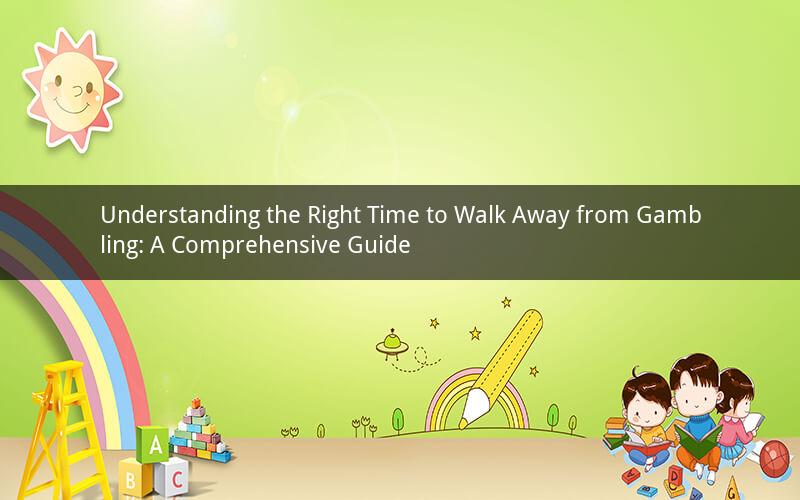
Introduction:
Gambling has become an increasingly popular form of entertainment for many individuals worldwide. However, for some, it can lead to devastating consequences. Recognizing the signs of problem gambling and knowing when to walk away is crucial for maintaining a healthy lifestyle. This article explores the various aspects of gambling and provides insights on when to quit, along with practical advice to help you make informed decisions.
I. The Dangers of Gambling:
1. Financial Losses: Gambling can lead to significant financial problems, as individuals may lose more money than they can afford to lose.
2. Emotional and Psychological Issues: Problem gamblers often experience negative emotional and psychological consequences, such as anxiety, depression, and addiction.
3. Legal and Social Consequences: Problem gambling can lead to legal problems, damaged relationships, and social isolation.
4. Physical Health Risks: Engaging in excessive gambling can lead to a range of physical health issues, such as heart disease, sleep disorders, and stroke.
II. Identifying Problem Gambling:
1. Financial: You may have problems paying bills, borrowing money, or hiding your gambling activities.
2. Emotional: You may feel guilt, shame, or anxiety about your gambling habits.
3. Social: You may experience strained relationships, neglect your responsibilities, or isolate yourself.
4. Physical: You may experience insomnia, headaches, or other physical symptoms related to stress.
5. Legal: You may face legal problems due to your gambling behavior.
III. Signs That It's Time to Walk Away:
1. Losing Interest in Other Activities: If gambling is the only thing that excites you, it might be time to consider quitting.
2. Borrowing Money: If you are relying on loans or credit cards to finance your gambling, it's a sign that you are taking on excessive debt.
3. Feeling Guilty or Ashamed: If you feel guilty or ashamed of your gambling behavior, it is important to address these emotions and seek help.
4. Ignoring Responsibilities: If you are neglecting your responsibilities, such as work, family, or personal obligations, it might be time to reconsider your gambling habits.
5. Increasing Risk of Gambling: If you are chasing losses or trying to win back money, it is a sign that you are at risk of developing a gambling problem.
IV. Steps to Quitting Gambling:
1. Admit the Problem: Acknowledge that you have a problem and seek help.
2. Set Clear Goals: Establish specific goals for quitting gambling and create a plan to achieve them.
3. Seek Support: Reach out to friends, family, or support groups for encouragement and guidance.
4. Avoid Temptations: Stay away from gambling venues, delete gambling apps, and avoid situations that may trigger your urge to gamble.
5. Consider Professional Help: If you are struggling to quit on your own, consider seeking the assistance of a therapist or counselor specializing in gambling addiction.
V. Resources for Help:
1. Gamblers Anonymous: A self-help group that offers meetings and support for individuals struggling with gambling addiction.
2. National Council on Problem Gambling: A resource that provides information, treatment, and support for individuals with gambling-related issues.
3. Gam-Anon: A support group for friends and family members of individuals with gambling problems.
4. Online Therapy: Many online therapy platforms offer specialized help for gambling addiction.
5. Local Helplines: Contact local helplines for immediate assistance and guidance on dealing with gambling problems.
Conclusion:
Recognizing when to walk away from gambling is essential for maintaining a healthy life. By understanding the dangers of gambling, identifying problem gambling, and seeking help when necessary, individuals can break free from the cycle of addiction. Remember, it's never too late to take control of your life and make informed decisions regarding your gambling habits.
Questions and Answers:
1. Q: What are the main signs of problem gambling?
A: The main signs of problem gambling include financial problems, emotional and psychological issues, social consequences, physical health risks, and legal troubles.
2. Q: How can I recognize if I'm at risk of developing a gambling problem?
A: You may be at risk if you are losing interest in other activities, borrowing money, feeling guilty or ashamed, ignoring responsibilities, or increasing your risk of gambling.
3. Q: Are there any resources available to help individuals struggling with gambling addiction?
A: Yes, there are various resources available, such as Gamblers Anonymous, the National Council on Problem Gambling, Gam-Anon, online therapy platforms, and local helplines.
4. Q: Can a person overcome a gambling addiction on their own?
A: While some individuals may be able to overcome their addiction on their own, seeking professional help and support from friends, family, or support groups can significantly increase the chances of recovery.
5. Q: What should I do if I suspect a loved one has a gambling problem?
A: If you suspect a loved one has a gambling problem, encourage them to seek help and support. Offer to help them find appropriate resources and be there for them during their recovery journey.